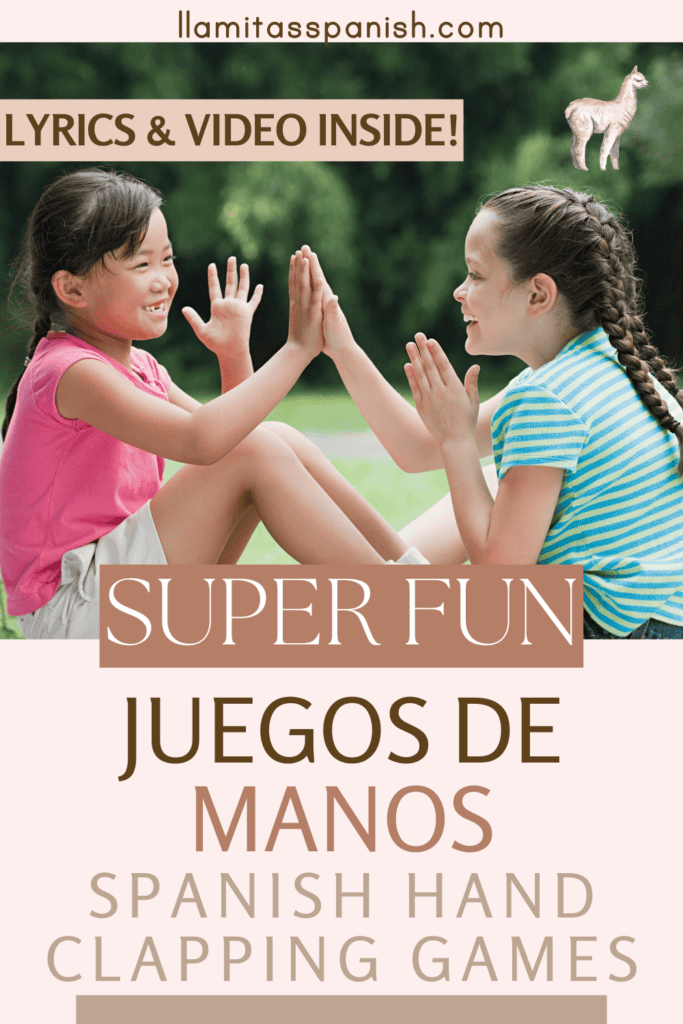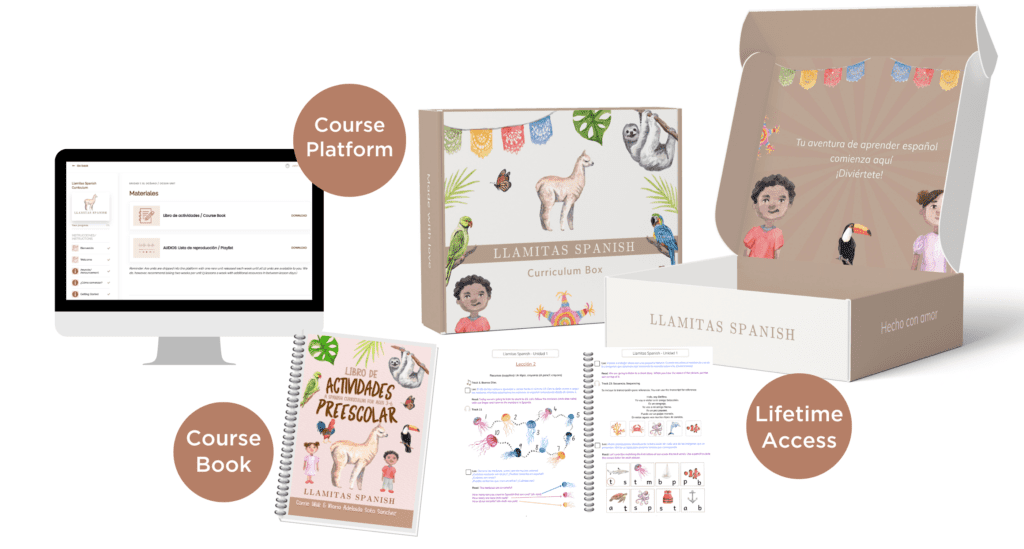In this post: Learn some fun hand-clapping games in Spanish! Classic juegos de manos like Marinero, Chocolate and more!
Clapping games (juegos de manos) are beloved among children and adults around the world, and with good reason. These games don’t require toys or objects, can be played by as little as two children, and you can play them anywhere!

For parents seeking ways to integrate Spanish language skills into their children’s lives, clapping games are a great tool to use to complement our very effective Llamitas Spanish® Curriculum (available in multiple levels).
Benefits of playing juegos de manos
Clapping games, sometimes called juegos de manos or juegos de palmas, have lots of benefits such as:
- Encouraging social interaction and cooperation
- Improving hand-eye coordination
- Developing memorization and rhythmic synchronization
- Developing pronunciation and vocabulary acquisition
- Developing focus and concentration to multitask
Clapping games also help to develop and enhance visual and auditory capacity and strengthen motor skills. These games encourage coordination of the hands to specific song lyrics, which naturally teaches children to regulate their breathing and build language acquisition.
Clapping games require a lot of practice and repetition in order to develop motor skills and learn song lyrics, so it’s actually a good thing that kids love these games and can’t seem to get enough of them.
Below we have compiled a list of our favorite Spanish clapping games, from beginners to advanced levels, to help your little linguistas learn Spanish.
Juegos de Manos: 6 Clapping Songs
For Beginners
Marinero se fue a la mar y mar y mar
para ver que podía ver y ver y ver
y lo único que pudo ver y ver y ver
fue el fondo de la mari mari mar
A popular English version of this song exists as follows:
“A sailor went to sea sea sea
To see what he could see see see
But all that he could see see see
Was the bottom of the deep blue sea sea sea”
Related post: Ocean Themed Spanish Lessons for Kids
Choco, choco, la, la
choco, choco, te, te
choco, la, choco, te
¡cho-co-la-te!
This simple rhyme continues with the theme of repeating the final syllable of each line, and is accompanied by a series of hand gestures corresponding to each line.
Juegos de palmas: Intermediates
Las Vocales (Tengo una muñeca)
Con la A, A, Daba Daba Da. Yo tengo una muñeca de CRISTAL.
Con la E, E, Debe Debe De. Yo tengo una muñeca de PAPEL.
Con la I, I, Dibi Dibi Di. Yo tengo una muñeca de MARFIL.
Con la O, O, Dobo Dobo Do. Yo tengo una muñeca de CARTÓN.
Con la U, U, Dubu, Dubu Du. Yo tengo una muñeca como TÚ.
Another very well-loved rhyme, popular across all Spanish-speaking countries, this rhyme teaches kids to isolate the vowel sounds and create unique sounds with them.
Related post: Best Spanish Alphabet Songs for Kids
En la calle – lle
veinticuatro – tro
se ha cometido – do
un asesinato – to.
Una vieja – ja
mato un gato – to
con la punta – ta
del zapato – to.
Pobre vieja – ja
pobre gato – to
pobre punta – ta
del zapato – to.
This very popular clapping game tells a sordid tale while repeating the final syllable of each word and associating that syllable with a specific movement.
It helps kids to understand the concept of syllables, as well as the principles of rhyme and rhythm.
Era una paloma, punto y coma
Se cayó del nido, punto y seguido
Era un día martes, punto y aparte
Era un día jueves, nadie se mueve
This clapping game also uses a variety of hand gestures to tell its simple story of a pigeon falling out of its nest. There are many versions of this popular song. We selected this version, which also helps learners remember the names of two days of the week.
Juegos de manos: Advanced
Don Federico perdió su cartera,
para casarse con una costurera;
la costurera perdió su dedal,
para casarse con un general;
el general perdió su espada,
para casarse con una bella dama;
la bella dama perdió su abanico,
para casarse con don Federico.
Don Federico perdió su ojo
para casarse con un piojo;
el piojo perdió sus patas,
para casarse con una garrapata;
la garrapata perdió su cola,
para casarse con una pepsi-cola;
la pepsi-cola perdió su burbuja,
para casarse con una mala bruja;
la mala bruja perdió su gatito,
para casarse con Don Federico.
Don Federico le dijo: Que NO
y la mala bruja se desmayó;
al día siguiente le dijo: Que SÍ
y la mala bruja se echó a reír.
Perhaps one of the oldest and most popular hand-clapping games across all of Latin America and Spain, Don Federico tells a convoluted story about a widower in search of a new wife.
This game includes so many theatrical gestures along with the hand-clapping rhythm, that it develops great coordination as well as memory in its players.
Here at Llamitas Spanish®, we know how useful it can be to use rhyme, repetition, and music to help kids learn Spanish.
Our philosophy is that a bilingual home is a fun-filled home where colorful variety is the norm. Our Llamitas Spanish® curriculum levels are rooted in authentic music, art, and literature to support your family in providing a dual language education.
For a completely done-for-you curriculum, visit our shop today and embark on your bilingual journey!



